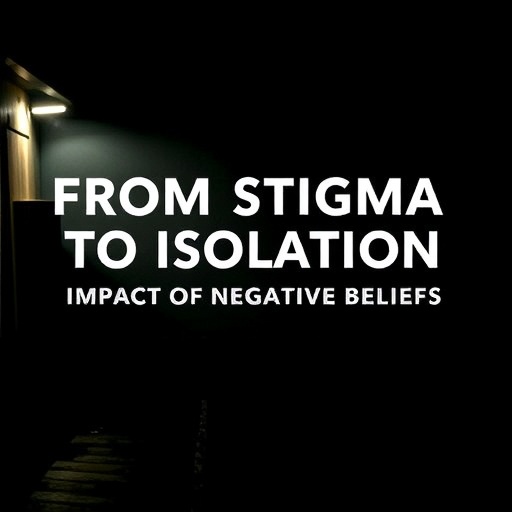In an era where societal acceptance of diverse sexual orientations has made significant strides, the intersection of religion and sexual identity surfaces as a complex and contentious subject. A revealing study that explores this dynamic is the work of Killian, Fredrick, and Merenda II titled “From Desecration to Disconnection: Connecting Negative Religious Beliefs About Sexual Minorities to Social Quality of Life.” This research uncovers how negative religious perceptions about sexual minorities can detrimentally influence their social quality of life, propelling an urgent conversation about inclusivity, tolerance, and understanding within religious communities.
This groundbreaking study delves into the intricate relationship between religious beliefs and the lived experiences of sexual minorities. The authors argue that negative beliefs often manifest in both overt and subtle forms, resulting in profound implications on the self-esteem and mental health of individuals within the LGBTQ+ community. By examining these variables, the research draws attention to the psychological dissonance faced by individuals whose identities are at odds with the religious tenets they may have been raised to uphold.
Central to the authors’ investigation is the notion of social quality of life—an encompassing term that covers various dimensions of well-being, including social interaction, mental health, and community participation. The study utilizes quantitative research methodologies to explore how religious indoctrination shapes the experiences of sexual minorities. The findings point to a clear correlation: those who perceive their sexual identity as conflicting with their religious beliefs often report lower levels of social connectivity and increased sentiments of isolation.
Killian and his colleagues meticulously dissect the nature of religious doctrines that perpetuate negative attitudes toward sexual diversity. They document the traditions that view homosexuality and non-heteronormative identities as sinful, fundamentally misunderstanding the experiences and identities of LGBTQ+ individuals. This misinterpretation not only alienates those who identify as sexual minorities but can also lead to a broader cultural atmosphere that fosters discrimination, prejudice, and stigma.
Moreover, the study underscores how these negative beliefs are not merely personal but are ingrained within larger institutional contexts, influencing community attitudes and, ultimately, social policy. Accepting individuals for their sexual identity can significantly enhance their social quality of life, fostering an environment where acceptance trumps ostracism. The authors advocate for a collective shift towards more inclusive interpretations of faith, arguing that enhanced dialogue within religious circles can dismantle long-standing stereotypes and facilitate deeper understanding.
As society continues to evolve, so too must the interpretations of religious texts and doctrines that influence community beliefs about sexual diversity. The need for religious leaders to engage with contemporary sociocultural dynamics is becoming increasingly urgent. The researchers suggest that faith communities that embrace a more compassionate and understanding stance towards sexual minorities not only improve the lives of these individuals but also enrich the spiritual fabric of the community itself.
While the study effectively highlights the detriments of negative religious beliefs, it also emphasizes the potential for positive change. Many religious organizations and leaders are beginning to advocate for acceptance and inclusion, empowering individuals to reconcile their faith with their sexual identity. This progressive turn demonstrates that religious belief can be a source of strength and resilience, rather than division.
Killian, Fredrick, and Merenda’s research is particularly significant as it highlights the urgent need for mental health resources tailored to those grappling with the tension between their faith and sexual identity. As therapy and counseling methods increasingly recognize the unique challenges faced by LGBTQ+ individuals, there is hope for improved mental health outcomes and social connectivity. The authors call for increased accessibility to supportive networks within faith communities, encouraging a shift towards environments that champion holistic well-being for all.
The implications of the study extend beyond academic inquiry into real-world application, suggesting actionable strategies for advocacy. By promoting awareness of the damaging effects of negative beliefs, community leaders can forge pathways for healing and empowerment. Workshops that educate on the importance of inclusion, along with advocacy for policy changes that protect the rights of LGBTQ+ individuals, are essential steps toward achieving lasting transformation within religious contexts.
In summary, the research presented by Killian and colleagues presents striking evidence of the profound impact that negative religious beliefs can have on the social quality of life of sexual minorities. It calls for an urgent reevaluation of these beliefs and encourages dialogue and education within religious communities. As society progresses, the hope remains that faith can be a unifying force that embraces rather than divides, nurturing a world where all individuals are celebrated for their inherent dignity and worth.
As the dialogue around this topic continues to evolve, the significance of this study lies in its ability to catalyze further conversations about faith, identity, and acceptance. The authors have laid a foundation for future research and advocacy that centers around inclusivity and community-building, providing resources and insights that can inform both personal journeys and communal practices.
By addressing the long-standing traditions that have fostered division and misunderstanding, we can aspire to create environments where diversity thrives, ultimately leading to richer, more vibrant communities that reflect our collective humanity.
Subject of Research: The impact of negative religious beliefs on the social quality of life of sexual minorities.
Article Title: From Desecration to Disconnection: Connecting Negative Religious Beliefs About Sexual Minorities to Social Quality of Life.
Article References:
Killian, T., Fredrick, E. & Merenda II, F. From Desecration to Disconnection: Connecting Negative Religious Beliefs About Sexual Minorities to Social Quality of Life.
Pastoral Psychol 74, 521–535 (2025). https://doi.org/10.1007/s11089-025-01235-1
Image Credits: AI Generated
DOI: 10.1007/s11089-025-01235-1
Keywords: Negative religious beliefs, sexual minorities, social quality of life, inclusion, mental health, community acceptance, LGBTQ+ advocacy.




